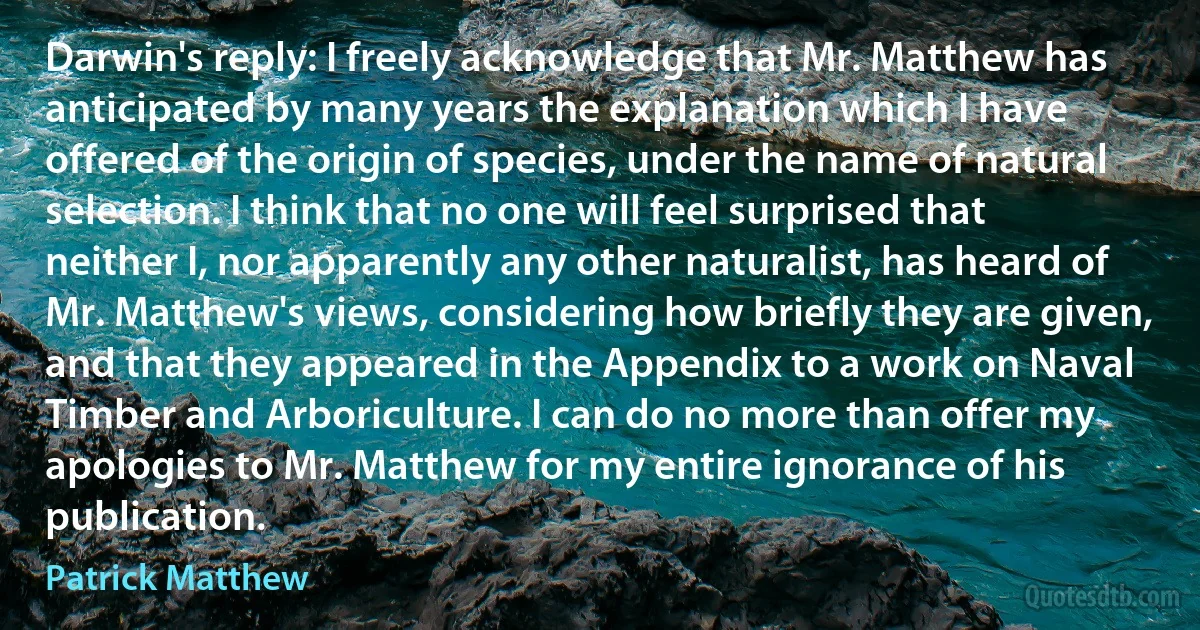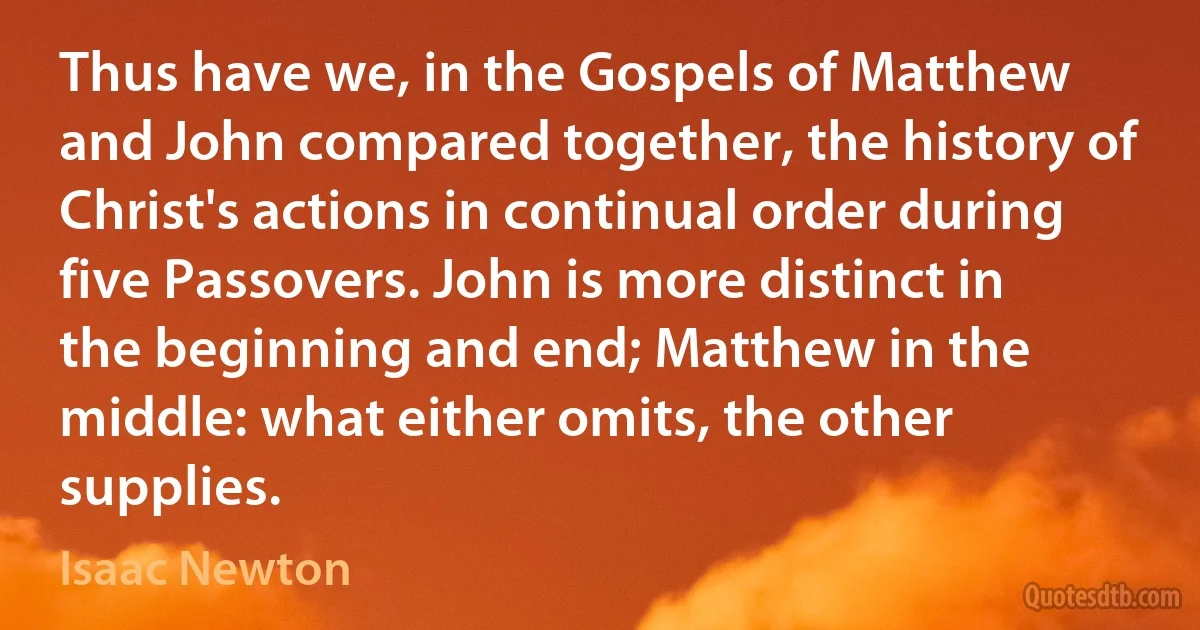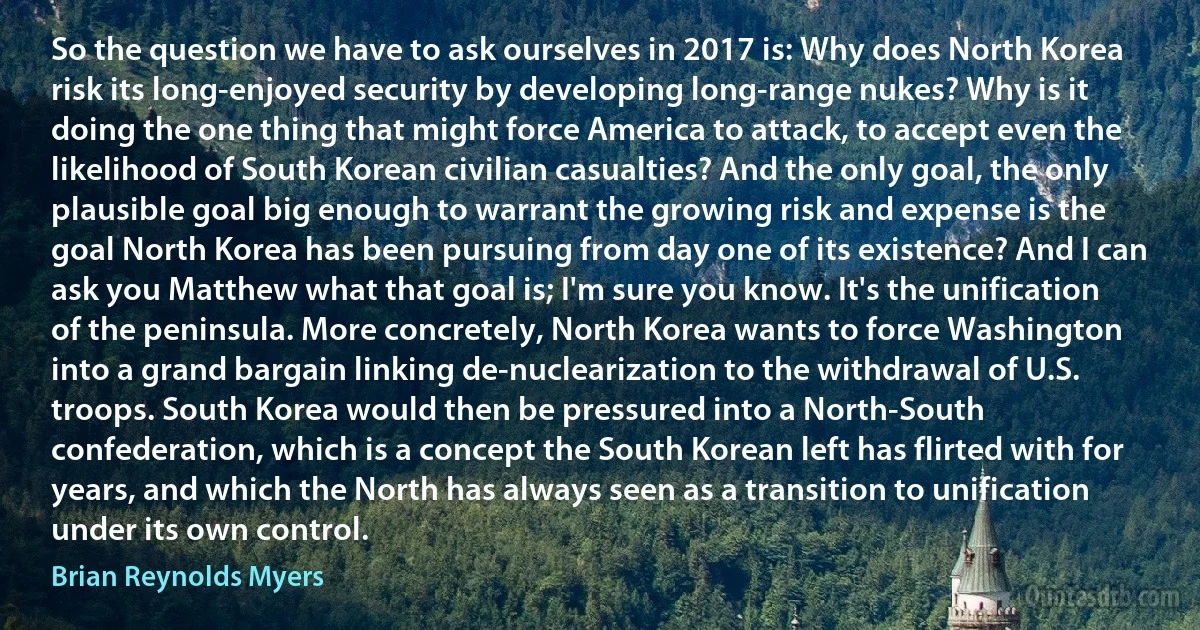Matthew Quotes - page 3
Like the other immigrant groups, the day will come when we win the economic and political rewards which are in keeping with our numbers in society. The day will come when the politicians do the right thing by our people out of political necessity and not out of charity or idealism.
That day may not come this year. That day may not come during this decade. But it will come, someday!
And when that day comes, we shall see the fulfillment of that passage from the Book of Matthew in the New Testament, "That the last shall be first and the first shall be last."

Cesar Chavez
For some reason, the most vocal Christians among us never mention the Beatitudes (Matthew 5). But, often with tears in their eyes, they demand that the Ten Commandments be posted in public buildings. And of course, that's Moses, not Jesus. I haven't heard one of them demand that the Sermon on the Mount, the Beatitudes, be posted anywhere. "Blessed are the merciful" in a courtroom? "Blessed are the peacemakers" in the Pentagon? Give me a break!

Kurt Vonnegut
I don't know what this so-called pure gospel is. Was the preaching of John the Baptist pure? He did not say only, "Repent, for the kingdom of heaven is at hand!" (Matthew 3:2). He also "rebuked [Herod]...for all the evils which Herod had done" (Luke 3:19). He was beheaded because he didn't confine himself to abstract teaching. Jesus did not preach only the "pure" Sermon on the Mount, but also what some actual church leaders would have called a negative sermon: "Woe to you, scribes and Pharisees, hypocrites!...Serpents, brood of vipers!" (Matthew 23:27,33). It is for such "impure" preaching that He was crucified. The Pharisees would not have bothered about the Sermon on the Mount.

Richard Wurmbrand
If any one will piously and soberly consider the sermon which our Lord Jesus spoke on the mount, as we read it in the Gospel according to Matthew, I think that he will find in it, so far as regards the highest morals, a perfect standard of the Christian life: and this we do not rashly venture to promise, but gather it from the very words of the Lord Himself.

Augustine of Hippo
The argument based on Jesus as liar, lunatic, or Lord was predicated on the assumption that Jesus had called himself God. [...] I had come to realize that none of our earliest traditions indicates that Jesus said any such thing about himself. And surely if Jesus had really spent his days in Galilee and then Jerusalem calling himself God, all of our sources would be eager to report it. To put it differently, if Jesus claimed he was divine, it seemed very strange indeed that Matthew, Mark, and Luke all failed to say anything about it. Did they just forget to mention that part?

Bart D. Ehrman
When the General of the Franciscans [ Nicolas IV ] ascended the papal throne, one of the first things he did, was to name as cardinal, Matthew Aquasparta, General of the Dominicans. No advantage of a personal character accrued to brother John from this event. But Matthew of Westminster sarcastically remarked, that the brothers of the Franciscan or Minorite order, regarded the pope as the sun, and the Archbishop of Canterbury as their moon. They thus set up their horn on high, and spared no order or rank in the Church of England.

John Peckham
Who would I cast to play me? [...] You know who I think would be good? Would be Matthew Broderick. He's got a good small funny. You need a small funny to play a comedian, not a big funny. Most comedians, you know, in their daily life are small funny, it's the little looks, the little things that they say, they're not clown-y.

Jerry Seinfeld
Although Jesus is widely considered mankind's greatest moral teacher, the greatest Christians, not to speak of scholars, have never been able to agree what his moral teachings were. Matthew, and he alone, reports that Jesus said: "Let your Yes be Yes, and your No, No." But the four Evangelists agree in ascribing to Jesus evasive and equivocal answers to plain questions, not only those of the high priest and Pilate; and quite generally the Jesus of the New Testament avoids straightforward statements, preferring parables and hyperboles. Some of the parables are so ambiguous that different Evangelists, not to speak of later theologians, offer different interpretations. ... On concrete moral issues, Jesus can be, and has been, cited on almost all sides.

Jesus Christ
The organ banks would be supplied for years. Not only would the crew have a full supply, which they always did anyway, but there would be spare parts for exceptional servants of the regime; i.e., for civil servants such as Jesus Pietro and his men. Even the colonists would benefit. It was not at all unusual for the Hospital to treat a sick but deserving colonist if the medical supplies were sufficient. The Hospital treated everyone they could. It reminded the colonists that the crew ruled in their name and had their interests at heart.
And the Sons of Earth was dead. All but one man, and from his picture he wasn't old enough to be dangerous.
Nonetheless Jesus Pietro had his picture tacked to the Hospital bulletin boards and sent a copy to the newscast station with the warning that he was wanted for questioning.
It was not until dawn, when he was settling down to sleep, that he remembered who belonged to that face. Matthew Keller's nephew...

Larry Niven
Logion 10 has a parallel in Luke xii. 49, but with a change of emphasis. The canonical version looks to the future: "I came to cast fire upon the earth, and how I wish it were already kindled!" In Thomas the fire has been kindled: "I have cast fire upon the world, and behold, I guard it until it is ablaze." This raises an interesting problem in relation to the common source of Matthew and Luke, since Matthew (x. 34) records a saying, "I came not to cast peace, but a sword." As already observed, something like this appears in logion 16, but in the saying in Thomas "division" and "fire" are paralleled in Luke, "sword" in Matthew. The question is whether in Thomas we have a conflation of the two synoptic versions, or a form of the saying derived from an independent tradition.

Thomas the Apostle
We come after. We know now that a man can read Goethe or Rilke in the evening, that he can play Bach and Schubert, and go to his day's work at Auschwitz in the morning. To say that he has read them without understanding or that his ear is gross, is cant. In what way does this knowledge bear on literature and society, on the hope, grown almost axiomatic from the time of Plato to that of Matthew Arnold, that culture is a humanizing force, that the energies of spirit are transferable to those of conduct?

George Steiner



